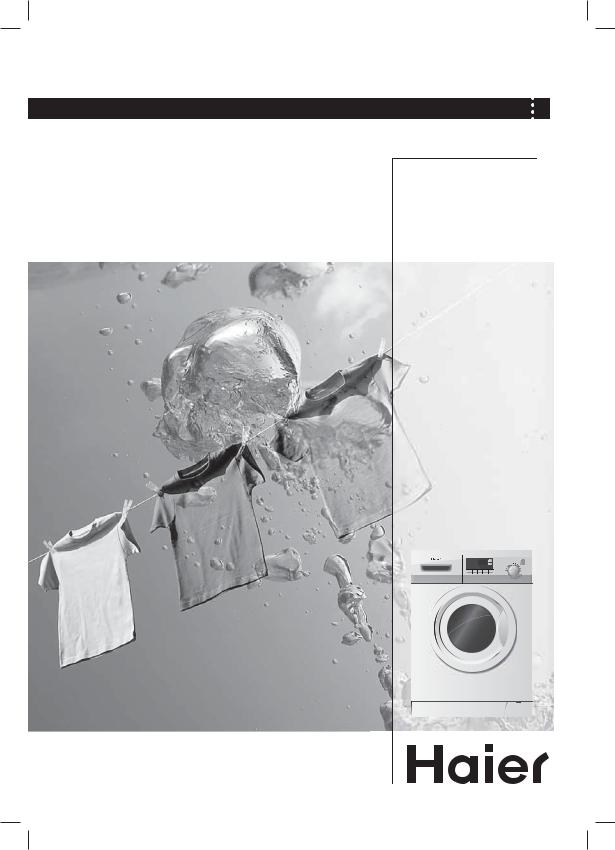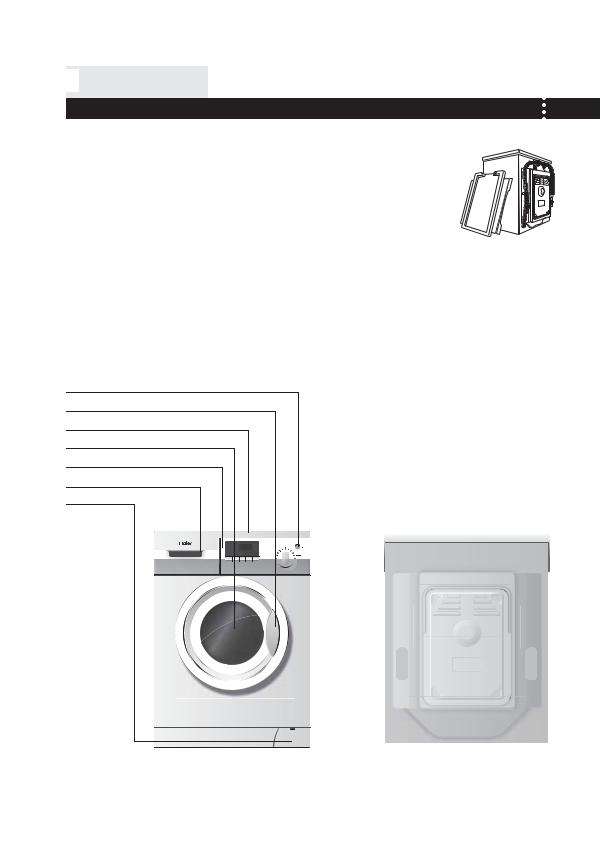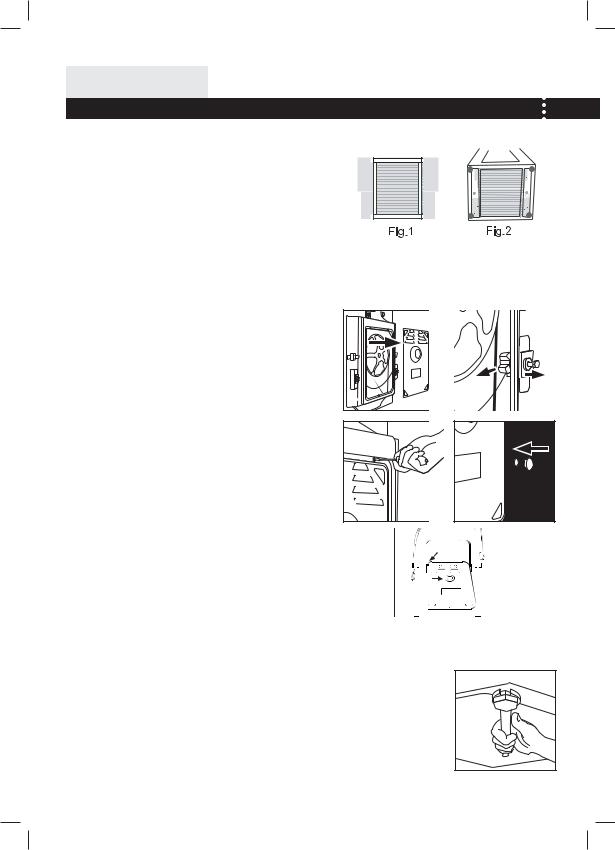Haier HWC1270TVE, HWC1070TVEME, HWC870TVEME, HWC1070TVE, HWC1470TVEME User Manual
...
AUTOMATIC DRUM WASHING MACHINE
USER MANUAL
HW-D1270TVE HW–D1270TVE ME HW-D1470TVE HW–D1470TVE ME

01 - 07 08 - 13 14 - 18
TABLE OF CONTENTS
BEFORE USE |
USING THE APPLIANCE |
MAINTENANCE |
>COMPONENTS .............................. |
3 |
>PREPARATION ............................... |
4 |
>SAFETY INSTRUCTIONS.................. |
5 |
>INSTALLATION............................... |
6 |
>CONTROL PANEL ........................... |
8 |
>PROGRAM SELECTION.................. |
10 |
>CLEANING & CARE....................... |
16 |
>CONSUMPTION AND TECHNICAL DATA ... |
11 |
>DISPLAY CODES .......................... |
18 |
>WASHING METHODS ................... |
12 |
>TROUBLESHOOTING..................... |
19 |
LEGEND
Yes
No
Optional
For your safety, any instructions in this manual with this "Warning" sign must be followed strictly.
DISPOSAL
As a responsible retailer we care about the environment. As such we urge you to follow the correct disposal procedure for your product and packaging materials.
This will help conserve natural recourses and ensure that it is recycled in a manner that protects health and the environment.
You must dispose of this product and its packaging according to local laws and regulations. Because this product contains electronic components, the product and its accessories must be disposed of separately from household waste when the product reaches its end of life.
Contact your local authority to learn about disposal and recycling. The product and packaging should be taken to your local collection point for recycling. Some collection points accept products free of charge.
We apologise for any inconvenience caused by minor inconsistencies in these instructions, which may occur as a resultof product improvement and development.

BEFORE USE |
|
|
3 |
COMPONENTS
Please read these instructions carefully before using this appliance. The instructions contain important information which will help you get the best out of the appliance and ensure safe and proper installation, use and maintenance.
Keep this manual in a convenient place so you can always refer to it for the safe and proper use of the appliance.
If you sell the appliance, give it away, or leave it behind when you move house, make sure you also pass on this manual so that the new owner can become familiar with the appliance and safety warnings.
ACCESSORIES
Check the accessories and literature in accordance with this list:
1x Inlet hose assembly |
1x Bottom cover |
1x User manual |
|
|
|
|
1x Drain hose bracket |
|
|
|
|
||||
|
|
|
||||
|
|
|
|
|
|
|
3x Blanking plugs

|
|
|
BEFORE USE |
|
4 |
|
|||
PREPARATION |
||||
|
||||
|
PREPARING THE MACHINE |
|
||
Remove all the packing materials to prevent unsteadiness, including the polystyrene base. Upon opening the package, water drops may be seen on the plastic bag and the porthole. This is normal phenomenon resulting from water tests in the factory.
DESCRIPTION
This diagram may be slightly different from the layout of the washing machine you have just purchased due to technical improvements.
Power switch Door handle Work Top Washer door Control Panel
Detergent distribution drawer Filter cover
Drain hose
Water inlet valve
Power cord
Back cover
Back cover screws
Transportation bolts
T2
S1 S2
T1 |
T3 |
|
S3 |

BEFORE USE |
|
|
5 |
SAFETY INSTRUCTIONS
BEFORE SWITCHING THE APPLIANCE ON FOR THE FIRST TIME
DO ...
... make sure that the transport bolt are removed.
... Use a separate earthed socket for the power supply.
... Make sure that the plug is accessible.
 ... Hold the plug and not the electric cable when unplugging the power supply.
... Hold the plug and not the electric cable when unplugging the power supply.
 ... Make sure that the fuses in the power circuit are rated for 15A.
... Make sure that the fuses in the power circuit are rated for 15A.
 ... Keep away from heat sources and direct sun light to prevent plastic and rubber components from aging.
... Keep away from heat sources and direct sun light to prevent plastic and rubber components from aging.
 ... Make sure that the power cord is not caught under or in the appliance and avoid damage to the power cable.
... Make sure that the power cord is not caught under or in the appliance and avoid damage to the power cable.
 ... Check that hose joints and connections are fi rm and no water can leak. If joints are loose or there is leakage, turn off the water supply and repair. Do not use the washing machine until the hoses are properly fi xed.
... Check that hose joints and connections are fi rm and no water can leak. If joints are loose or there is leakage, turn off the water supply and repair. Do not use the washing machine until the hoses are properly fi xed.
DURING DAILY USE OF THE APPLIANCE
DO ...
DO NOT ...
 ... Touch or use the appliance when barefoot or with wet or damp hands or feet.
... Touch or use the appliance when barefoot or with wet or damp hands or feet.
 ... Use fl ammable detergent or dry cleaning agent.
... Use fl ammable detergent or dry cleaning agent.
... Use any fl ammable sprays in close vicinity to the appliance.
 ... Remove or insert the plug in the presence of fl ammable gas.
... Remove or insert the plug in the presence of fl ammable gas.
 ... Allow children or infi rm persons to play with the appliance or packing materials.
... Allow children or infi rm persons to play with the appliance or packing materials.
 ... Install the appliance outdoors in a damp place, or in an area which may be prone to water leaks such as under or near a sink unit. In the event of a water leak allow the machine to dry naturally.
... Install the appliance outdoors in a damp place, or in an area which may be prone to water leaks such as under or near a sink unit. In the event of a water leak allow the machine to dry naturally.
 ... Place the washing machine directly on a carpet, or close to a wall or furniture.
... Place the washing machine directly on a carpet, or close to a wall or furniture.
DO NOT ...
 ... Pull up zips and fi x loose threads to prevent the items from being entangled. If necessary, put small items into a net bag or pillow.
... Pull up zips and fi x loose threads to prevent the items from being entangled. If necessary, put small items into a net bag or pillow.
 ... Turn off the machine after each wash program and switch it off at the mains to save electricity and for safety. Wipe clean the lower part of the porthole.
... Turn off the machine after each wash program and switch it off at the mains to save electricity and for safety. Wipe clean the lower part of the porthole.
 ... Keep the door slightly open when the washing machine is not in use to prevent formation of odours.
... Keep the door slightly open when the washing machine is not in use to prevent formation of odours.
 ... Let the power cord be replaced by the manufacturer, his service agent or other accordingly qualifi ed persons, in case it is damaged.
... Let the power cord be replaced by the manufacturer, his service agent or other accordingly qualifi ed persons, in case it is damaged.
 ... Ensure that the appliance is not used by persons with reduced physical, sensory or mental capabilities, lack of experience and knowledge without supervision or instruction by a person responsible for their safety.
... Ensure that the appliance is not used by persons with reduced physical, sensory or mental capabilities, lack of experience and knowledge without supervision or instruction by a person responsible for their safety.
 ... Supervise children to ensure that they do not play with the appliance.
... Supervise children to ensure that they do not play with the appliance.
 ... Touch the washer door during the washing process - it gets hot!
... Touch the washer door during the washing process - it gets hot!
 ...Place heavy objects or sources of heat or damp on top of the appliance.
...Place heavy objects or sources of heat or damp on top of the appliance.
... Hot wash foam rubber or sponge-like materials.
 ... Open the detergent distribution drawer during the wash cycle.
... Open the detergent distribution drawer during the wash cycle.
 ... Force the washer door open. The door is fi tted with a self-lock device and will open shortly after the washing procedure is ended.
... Force the washer door open. The door is fi tted with a self-lock device and will open shortly after the washing procedure is ended.
 ... Open the washer door if the water level is visibly over the porthole.
... Open the washer door if the water level is visibly over the porthole.
 ... Cover the washing machine with plastic cover so that inside dampness cannot be kept in.
... Cover the washing machine with plastic cover so that inside dampness cannot be kept in.

6 |
BEFORE USE |
INSTALLATION
ADJUSTING THE BOTTOM COVER
When open the shrink package,you will fi nd a calcium plastic board which is laid on the top of washing machine as shown in fi g.1.The board is used for reducing noise by pasting it under the cabinet when setting as shown in fi g.2
It keeps out the dampness and reduces the noise.
DISMANTLE THE TRANSPORTATION BOLTS
The transportation bolts are designed for clamping anti-vibration components inside of the washing machine during the transportation process.
1.Remove the back cover.
2.Remove the three bolts on the rear side and take out the synthetic stabilisers from within the machine.
3.Replace the back cover.
4.Fill the holes left by the bolts with blanking plugs.
Note:
1.When you replace the back cover,the convexity must face to outside, and you
have to insert the back cover from the two gaps as shown in fig.3.
2.Keep the transportation bolts and synthetic stabilisers in a safe place for later use.
1. |
2. |
3. 4.
fig.3 

Adjusting the washing machine
There are adjustable feet under the bottom of the washing machine. Before use, they should be adjusted so that the machine is level. This will minimise vibrations and thus noise during use. It will also reduce wear and tear. We recommend using a spirit level to level the appliance.
